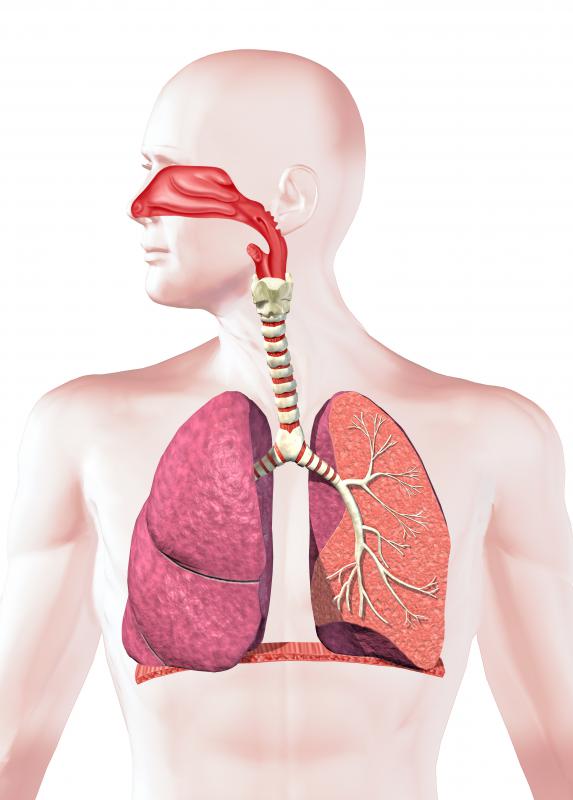At WiseGEEK, we're committed to delivering accurate, trustworthy information. Our expert-authored content is rigorously fact-checked and sourced from credible authorities. Discover how we uphold the highest standards in providing you with reliable knowledge.
What is the Connection Between a Cough and Lung Cancer?
A persistent cough and lung cancer often go hand in hand. Coughing caused by lung cancer can manifest itself in a variety of ways. For example, it might appear as an annoying cough that won't go away or as a severe cough containing blood and sputum. Developing a cough is not necessarily, however, a strong indication that one has lung cancer; coughing is a natural and often healthy reaction to a variety of things. As a result, it can be difficult to tell when a cough may indicate something as serious as lung cancer. There are some indications a particular cough and lung cancer might be related: if the cough is nagging; if it’s accompanied by other symptoms, such as chest pain; and if the cough contains any blood.
One of the chief causes of lung cancer is smoking. For those who smoke cigarettes and deal with "smoker's cough," paying attention to the nature of the cough is particularly important. Even the subtlest changes in a smoker's cough could indicate the presence of lung cancer and should receive swift medical attention. A quick diagnosis is paramount and can completely alter one's odds of overcoming a bout with cancer.

For those who don't smoke or haven’t already dealt with a chronic cough, deciphering whether a cough and lung cancer are related may be more difficult. For such people, a doctor's visit may be advised if a cough is accompanied by other worrisome symptoms, such as chest pain, wheezing, and shortness of breath. Any situation in which a person develops a persistent cough should also be brought up to a doctor. Furthermore, one should always seek medical attention if a cough contains any amount of blood in it.

A bad cough and lung cancer often result in blood and sputum. When a cough contains blood, it is referred to as hemoptysis. Hemoptysis is one of the most serious indicators that a cough and lung cancer are related. There are different reasons that lung cancer can cause hemoptysis. Tumors caused by the cancer may result in blood in the lungs, which is coughed out. The cancer may also erode and collapse certain lung functions, resulting in blood during coughing.

A bad cough can be one of the more surprising difficulties of cancer, acting as a constant distraction, inducing pain, and interrupting the sleep cycle. Doctors treating cancer can prescribe various drugs, such as codeine, for treating a bad cough. Surgically removing cancerous tumors and other cancer treatments can also help to alleviate cough symptoms.
AS FEATURED ON:
AS FEATURED ON:















Discussion Comments
When I started coughing up blood, I knew something was seriously wrong. My cough really is annoying and affects many things about my life that you wouldn't think of. It is hard to get a good night's sleep, and the cough is more painful than what most people realize.
He will feel better knowing and you will too. I have had a smoker's cough for a long time. I quit smoking 5 years ago, but still have this cough and have not been diagnosed with lung cancer.
Our son has smoked since he was a teenager, and even though he knows the risks and lung cancer facts, has had a hard time giving up cigarettes.
He has developed a cough and doesn't seem to have much lung capacity, and I am worried that he might be showing signs of lung cancer. I think it is easy for people to think it won't happen to them, and he has put off going to the doctor.
I have never smoked so it is easy for me to tell him to just quit smoking. I am scared he is going to develop lung cancer from his years of smoking, and keep encouraging him to at least get it checked out.
My husband has never smoked, but has a persistent, dry cough all year long. I am always worried this might be an early symptom of lung cancer, but his doctor says that is not the case.
He has worked construction most of his life and breathed in all kinds of chemicals that are not good for him. I think that is what has taken a toll on his lungs after all these years.
The cough doesn't get any worse, and he never has any chest pain or blood with it. It is still something that is of concern to me, and I always listen to make sure there aren't any changes in his cough.
Post your comments